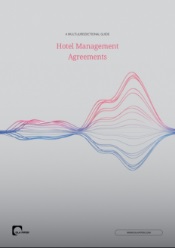The German market is still dominated by lease agreements. Compared to other jurisdictions HMAs are therefore less common. Direct HMAs between owners and operators aren’t too popular with owners, especially with regulated real estate investment funds, which often cannot conclude HMAs due to not being permitted to conduct any operational business. However, indirect HMAs and Franchise Agreements with a third-party/white label operators in the middle are filling this gap and are more common.
Download this country guide in PDF format:

HMAs for hotels managed by the international hotel brands are unusual in this jurisdiction but there are some well-known examples for certain upscale brands and hotel properties.
HMAs for white label management companies are far more common in our jurisdiction and contain many of the same characteristics as the branded HMAs.
Download this country guide in PDF format:

They exist and are becoming more common; however, management agreements as drafted and imposed by international chains have never been popular among hotel owners, many of whom wish to have some involvement in the management of the property. This may explain why the penetration of international chains in Spain has not been high.
Download this country guide in PDF format:

Yes. HMAs are used across the US, typically for upper scale and luxury tier hotels operated under a major hotel brand. As franchised brands have increased across the US in recent years, third-party managers operating under a brand franchise have increased. We have also seen an increase in conversion of managed to franchised hotels as owners seek to have more control over operations and reduce operating costs. Third-party management agreements and brand management agreements are very different in both form and terms. The focus of this guide is brand-managed HMAs.
Download this country guide in PDF format:


Australia
Is there a standard contract period of an HMA?
The duration of HMAs depends in part on the bargaining position of the operator – for major operators, terms of 20+ years are not uncommon. The duration also depends on the nature of the assets, with landmark assets often attracting longer terms.
Is the term usually fixed? Are early exit or similar options included (contractual or implied)?
The term is usually fixed.
It is increasingly common to integrate early exit mechanisms where operators underperform for a sustained period. This is in addition to standard early termination rights, such as for an insolvency event (eg liquidation, receivership, statutory winding up) or where a third party brings any claim or commences proceeding relating to the owner's title to the hotel or land.
Is it usual to include fees / liquidated damages for early termination?
Exit fees for early termination for convenience (ie without cause) or on sale of the property by the owner, and excluding termination in the case of manager default, are common. The level of termination fees/liquidated can vary depending on a number of commercial factors (eg location, type of hotel, market position of brand) and the reason for early termination (ie for convenience vs where the property is sold).
What is the usual position in respect of renewal?
It is common to have renewal periods that are subject to agreement between the parties; options that are exercisable unilaterally are less common. Renewal periods vary depending on the operator and are driven by their own operational needs. Renewal periods as part of an HMA are often negotiated as part of any agreed future capital improvement program for the hotel asset.

Australia
Is there a standard fee structure for HMAs (eg base + incentive)?
HMA fee structures typically comprise a percentage of gross annual revenue (base fees), and a sliding scale percentage of the adjusted gross operating profit, where the operator meets profitability thresholds (incentive fee). The fee structure will depend on various factors including the extent to which the operator or the hotel owner contribute to capital and operational costs of the hotel over the term of the HMA.
What other fees and charges are there (such as royalties, accounting, marketing, license fees, etc.)?
Depending on the parties and type of hotel, marketing contributions and/or fees for use of services such as accounting, software, reservation networks or intellectual property (including branding) may be payable.
Are owners typically required to set aside funds for fixtures and fittings?
Yes. Owners are typically required to make furniture, fitting and equipment (FF&E) contributions for general repairs and maintenance of the hotel, and any other budgeted capital expenditures.

Australia
What is the usual standard imposed on an operator in respect of the operation of the hotel?
Commonly, the standard imposed on the operator is that the operator will use the skill, effort, care and expertise reasonably expected of a prudent operator of hotels with regard to the brand and brand standards of the hotel operator. KPIs and other prescriptive standards are less common, although the inclusion of such standards varies depending on the operator and the consequences flowing from failures to achieve such standards, the operator and the asset.
What performance measures are commonly used in the jurisdiction?
Common performance measures are generally related to performance against an agreed budget and/or Revenue Per Available Room (RevPAR) relative to a set of similar competitors.
These measures are often linked to termination rights for failures to meet these standards.
Is an operator or owner guarantee common in the jurisdiction?
The inclusion of guarantees depends on the identity and structure of operator and owner, including the financial position and assets held by them.
What is the usual position in respect of employees? With whom does the liability for the employees sit?
Commonly, the owner of the hotel employs the employees and the employees take directions under the supervision of the operator. In these circumstances, the hotel owner is liable with respect to:
- minimum wage obligations, work, health and safety (WHS) and discrimination law compliance;
- any penalties, damages, compensation or other order arising of unfair dismissal; and
- vicariously liability for the acts and omissions of employees.
For everyday management, owners usually give operators permission to direct and control its employees.
In some cases, the general manager, and possibly other key employees (eg executive chef), will be employed by the hotel operator.
Is it usual to have a non-compete clause, eg that no other property with that brand can open within a certain radius?
Yes, based on a geographic radius.
Who is responsible for insurance?
The owner is typically responsible for obtaining insurance for:
- the property;
- business interruption;
- workers compensation for employees employed by the owner; and
- items owned by the owner or people other than the operator.
The operator is typically responsible for the following insurances:
- public liability;
- workers compensation for employees employed by the operator;
- motor vehicle;
- employee fidelity; and
- other operating risks it is customary to insure against in the operation of hotels.
Does the HMA give rights in real estate in the jurisdiction?
No, provided that the HMA does not operate as a lease or give rise to a leasehold interest.
Does the HMA need to be recorded against the property, if this is possible in the jurisdiction?
No.
However, where an HMA is not recorded against the property (for example, via a caveatable interest and caveat registered against the title to the property), operators will need to ensure they properly secure their operating rights in the event the hotel property is sold.
Where financing is taken, is it standard to obtain a Non-Disturbance Agreement (NDA) as part of a management or lease agreement?
Yes. The terms of NDAs vary depending on the parties.
What other agreements usually sit alongside an HMA in the jurisdiction?
There may be other associated agreements depending on the operator, which can include:
- IP licensing agreements;
- services agreements for the provision of services (eg accounting, software licensing, access to reservation networks);
- individual employment contracts for the general manager of the operator;
- supply agreements; and
- mortgagee step-in right deeds (on behalf of the owner).

Australia
What are the standard rights / restrictions in respect of transfer / sale of the hotel?
The rights and restrictions applicable to the transfer/sale of the hotel depend on the operator and the asset. For major operators and/or landmark assets, the consent of the operator is commonly required for the hotel to be sold or transferred. Otherwise, the owner is usually permitted to transfer or sell the hotel without the consent of the operator.
When a managed hotel is sold (either asset or share deal), is it usual in the jurisdiction that either the Operator's consent is required for the sale, or that the hotel may only be sold if the HMA transfers with the hotel?
Both. In relation to the requirement for the consent of the operator, see above – it depends on the operator and the asset; however, commonly with marquee hotels operated by international hotel operators, their consent is usually required, and commonly provided if the purchaser agrees to be bound by the HMA following the sale of the hotel.
Whether this is the case with other operators, or if the owner can sell the hotel property with vacant possession will depend on the terms of the HMA.
For taxation reasons, hotels are commonly sold with the HMAs in place, even if these can be terminated after settlement. Taxation advice should be sought as part of any hotel acquisition or disposal.
Do HMAs commonly include a right of first refusal for the operator to purchase the hotel?
It depends on the operator and the asset. Some operators also own hotels and therefore like to have a first right of refusal, while other organizations that are simply operators do not seek such a right.
Is it usual to include provisions which enable the sale of the property with vacant possession ie without the brand?
As above, these depends on the terms of the HMA and the operator. There are different tax consequences arising if the hotel property is sold with vacant possession and taxation advice should be sought as part of any hotel disposal.
